
The Malay Archipelago or also called the Indo-Australian Archipelago is the archipelago between Mainland Southeast Asia and Australia. It has also been called the "Malay world," "Nusantara", "East Indies" and other names over time. The name was taken from the 19th-century European concept of a Malay race, later based on the distribution of Austronesian languages.
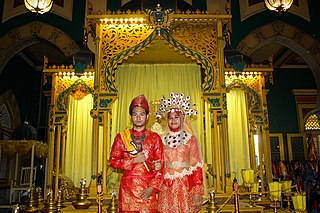
Adat is a generic term derived from Arabic to describe a variety of local customary practices and traditions as observed by Muslim communities in the Balkans, North Caucasus, Central Asia, and Southeast Asia. Despite its Arabic origin, the term adat resonates deeply throughout Maritime Southeast Asia, where due to colonial influence, its usage has been systematically institutionalised into various non-Muslim communities. Within the region, the term refers, in a broader sense, to the customary norms, rules, interdictions, and injunctions that guide individuals' conduct as members of the community and the sanctions and forms of address by which these norms and rules are upheld. Adat also includes the set of local and traditional laws and dispute resolution systems by which these societies are regulated.
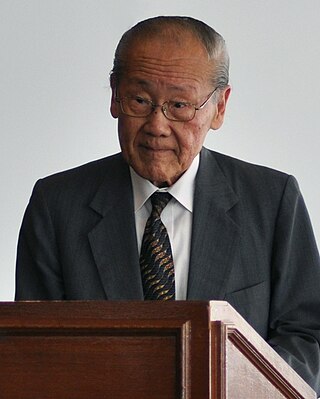
Wang Gungwu, is a Chinese-Singaporean historian, sinologist, and writer. He is a historian of China and Southeast Asia. He has studied and written about the Chinese diaspora, but he has objected to the use of the word diaspora to describe the migration of Chinese from China because both it mistakenly implies that all overseas Chinese are the same and has been used to perpetuate fears of a "Chinese threat", under the control of the Chinese government. An expert on the Chinese tianxia concept, he was the first to suggest its application to the contemporary world as an American Tianxia.
The Association for Asian Studies (AAS) is a scholarly, non-political and non-profit professional association focusing on Asia and the study of Asia. It is based in Ann Arbor, Michigan, United States.
Benedict John Kerkvliet is Emeritus Professor at the Department of Political and Social Change, School of International, Political & Strategic Studies, Australian National University. He works across the areas of comparative politics, Southeast Asia and Asian studies. Kerkvliet was born and raised in Montana, surrounded by working-class relatives and friends for whom political discussion and debate were part of life. After graduating from the local public high schools, he earned his B.A. at Whitman College and his M.A. and Ph.D. at University of Wisconsin–Madison. He taught at the University of Hawaiʻi at Mānoa) for nearly twenty years before joining the Australian National University in 1992 where he was a Professor and Head of the Department of Political and Social Change, Research School of Pacific and Asian Studies. Kerkvliet currently resides in Hawaiʻi with his wife Melinda.
Southeast Asian studies (SEAS) refers to research and education on the language, culture, and history of the different states and ethnic groups of Southeast Asia. Some institutions refer to this discipline as ASEAN Studies since most of the countries that they study belong to the Association of Southeast Asian Nations or ASEAN. Definitions of what constitutes Southeast Asia differ between scholars, which blurs the boundaries between Southeast Asian studies and other regional studies like Oriental studies and post-colonial studies. Southeast Asian studies incorporates anthropology, religious studies, linguistics, and international relations.
The Laotian Chinese are Laotian citizens of Han Chinese ancestry. They constitute one of the many Overseas Chinese residing in Southeast Asia. At present, they constitute an estimated 1 to 2 percent of the Laotian population. The Laotian Chinese community have a disproportionately large presence in the Laotian business sector and dominate the Laotian economy today.
Farish Ahmad Noor is Professor at the Department of History, Faculty of the Arts and Social Sciences, University of Malaya.
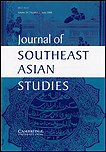
The Journal of Southeast Asian Studies is a peer-reviewed academic journal covering scholarly studies on Southeast Asia. It publishes articles from a wide range of disciplines in the humanities and social sciences. The journal's extensive book review section includes works in Southeast Asian languages. From its foundation in 1960 until 1969, it was the Journal of Southeast Asian History.

The Singapore Economic Review is a peer-reviewed academic journal published by World Scientific. The journal was established in 1956 as the Malayan Economic Review, obtaining its current name in 1969. It is the official journal of the Economic Society of Singapore. The journal covers economics in general, with an emphasis on economic issues in Asia. According to the Journal Citation Reports, the journal has a 2020 impact factor of 1.315.
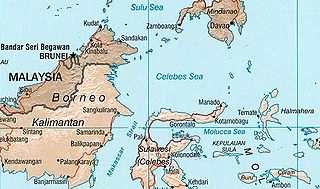
The Sulu and Celebes Seas, a semi-enclosed sea area and porous region that covers an area of space around 1 million square kilometres, have been subject to illegal maritime activities since the pre-colonial era and continue to pose a maritime security threat to bordering nations up to this day. While piracy has long been identified as an ubiquitous challenge, being historically interwoven with the region, recent incidents also include other types of maritime crimes such as kidnapping and the trafficking of humans, arms and drugs. Attacks mostly classify as 'armed robbery against ships' according to the United Nations Convention on the Law of the Sea as they occur in maritime zones that lie under the sovereignty of a coastal state. Incidents in the Sulu and Celebes Seas specifically involve the abduction of crew members. Since March 2016, the Information Sharing Centre (ISC) of the Regional Cooperation Agreement on Combating Piracy and Armed Robbery against Ships in Asia (ReCAAP) reports a total of 86 abuctions, leading to the issue of a warning for ships transpassing the area.
The ISEAS–Yusof Ishak Institute is a research institution and statutory board under the purview of the Ministry of Education in Singapore. It was established by an Act of Parliament in 1968.
Australian Archaeology is a peer-reviewed academic journal published by the Australian Archaeological Association. It was established in 1974 and covers all fields of archaeology as well as other subjects that are relevant to archaeological research and practice in Australia and nearby areas. The journal uses a broad definition of archaeology to include prehistoric, historic, and contemporary periods and includes social, biological, and cultural anthropology, history, Aboriginal studies, environmental science, and other related areas. As of December 2021 the editors are Sean Ulm and Annie Ross assisted by associate editor Ariana Lambrides and book review editor Mirani Litster.

Acadiensis: Journal of the History of the Atlantic Region is a semi-annual peer-reviewed academic journal covering the history of Atlantic Canada. The current editors-in-chief are Erin Morton and Peter Twohig. It is published by the Department of History at the University of New Brunswick, with articles in either English or French. The name Acadiensis originated with an earlier periodical with the same name, a general interest quarterly magazine for the Maritime provinces, with an emphasis on local history. It was published in Saint John, New Brunswick by David Russell Jack from 1901 to 1908 but failed due to insufficient financial support.
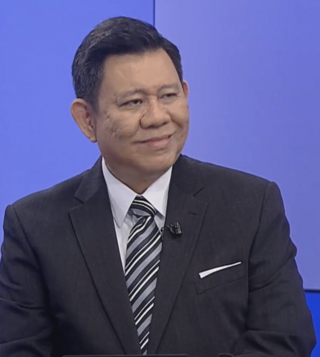
Julio Cabral Teehankee is a Filipino political scientist. He is Full Professor of Political Science and International Studies at De La Salle University (DLSU) where he served as Chair of the Political Science Department (1994–2007); Chair of the International Studies Department (2008–2013); and Dean of the College of Liberal Arts (2013–2017).
In July 2005, Indonesian Ulema Council (MUI), a semi-official Islamic clerical body of Indonesia, issued a fatwa, or an Islamic legal opinion, against religious pluralism, liberalism, and secularism. The issuance of fatwa garnered substantial controversy and scholarly attention. The fatwa addressed the reformist trend of Islam which had been popular among the broad Indonesian society over the past 25 years. Such trends advocated for a more substantive reading of the Quran and Hadith, instead of literalist approaches taken by the majority of ulamas. MUI considered such ideas as incompatible with Islamic teaching, releasing the fatwa to promote a more literal reading of the Islamic scriptures. The fatwa was heavily criticized by progressive Muslim intellectuals.
Anthropological Forum (AF) is a scientific journal in anthropology and comparative sociology. It was founded in 1963 by Ronald Berndt: at the University of Western Australia and is sponsored by the Berndt Museum of Anthropology in Perth. In its early years of existence, it published widely on Aboriginal Australian issues, but has since developed to include anthropological studies of all cultural and geographical areas as well as on a wide range of theoretical issues.
Informit is most well known as an online database that provides access to over 100 databases, some of which provide full-text sources. The online versions of the Australian Public Affairs Information Service (APAIS) subject index, and the Australian Public Affairs Full Text (APAFT) are part of the Informit database collection.
Frits Hermann ('Kees') van Naerssen was a scholar of Javanese epigraphy and an early figure in Asian studies in post-war Australia.
The Australian Society for Asian Humanities is the oldest academic society in Australasia dedicated to the study of Asia and to the promotion of "the knowledge of Asia in Australia by providing a meeting-place where scholars could present their work to their peers and to the community at large." Founded in 1956 by A.R. Davis as the Oriental Society of Australia, in its early years it was "open to subscribers across the country but the bulk of its members were in Sydney." It acquired its present name in 2021. The focus on Sydney ultimately resulted in the establishment of the Asian Studies Association of Australia (1975) and the New Zealand Asian Studies Society (1974) rather than a geographic expansion of OSA membership. The society also hosts regular seminars, the annual A.R. Davis Memorial Lecture as well as an Emerging Scholars Award.







